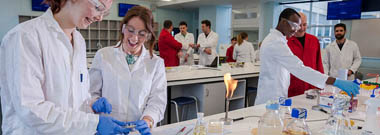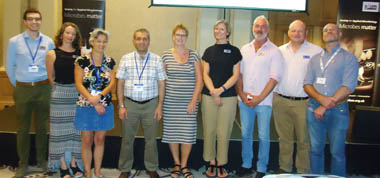Building for the future: Marwan's journey
My academic interests lie in medical and applied microbiology. I obtained my Ph.D. in Microbiology from Damascus University in Syria in 2015 and have about 14 years teaching experience in both Syrian high schools and at Damascus University.
Due to the war, I was forced to leave Syria in 2016. I sought safety in Turkey for myself, wife and young son. While there, the Cara Syria Program came to my attention, prompting me to join.
Cara makes the most of our time in exile to help build skills and enable our continued academic engagement and contribution. By facilitating connection and collaboration with colleagues from the wider academic community, this enhances our value to Syria as a major part of its intellectual and cultural capital. I have been a member of SfAM since 2012.
Aim of the visit
The aim of this research incubation visit was to support my professional connection to staff and students at Liverpool University’s Microbiology Research Group (MRG). There were opportunities to experience capacity-building and training in new methods in microbiology, and to develop a longer-term joint research collaboration.
The scheme also gave me honorary institutional affiliation to allow my continued access to the university’s online resources following completion of the visit and return to Turkey.
The visit was hosted by Alan McCarthy, Professor of Microbiology and Head of Admissions and Recruitment for the School of Life Sciences, and supervised by Dr. Malcolm Horsburgh, Senior Lecturer, Functional and Comparative Genomics.

DNA and RNA
Over the second to the sixth week I conducted laboratory experiments and received training in areas such as spray assay technique, DNA and RNA extraction, PCR, gel electrophoresis and Biofilm plate method.
This also provided me with an amazing opportunity to observe how the MRG worked and in particular the MRG’s Staphylococcus Research Group (SRG) supervised by Dr. Horsburgh.
My visit also provided me with the opportunity to attend two international conferences in the UK and an award event linked to the Syria Programme. The first was a Royal College of Physicians of Edinburgh conference on Infectious Disease (14 June 2018) at which I was able to meet and speak to professionals in my field. Presentations including topics such as AIDS, Ebola, TB and antibiotic resistance.
Benefits of Brighton
The second was the AMI Annual Conference ‘Passport to Infection: Infections of travel & Leisure’ (9th-11th July 2018) in Brighton.
It encompassed a very valuable overall programme of presentations, but of particular interest to me were those by G. Hara and E. Jones on ‘Holidays from hell-selected case reports from the hospital for tropical diseases’, and L.H. Chen on ‘Sun, sea and surgery-infection risks of medical tourism’.
I also found the ECS presentations, workshops, posters and a trade exhibition of new microbiological tests of great interest. It was a really precious opportunity to engage with, and benefit from, the microbiology community during the conference.

Linguistic evolution
The final event that I attended was the British Council ELTons (English Language Teaching) Innovation Awards, which took place on 19th June 2018 at the Savoy Palace in London. The Cara Syria Programme was amongst those projects shortlisted for the ELTons ‘local innovation award’, but unfortunately it didn’t win. The event was both exciting and interesting and I spent the evening talking to the other guests practicing my English skills.
A key outcome of the Cara Syria Programme research incubation visits is the development of collaborative research with faculty members within the host institution, in this case Liverpool University.
Molecular methodologies
The research that I hope to take forward with Dr. Horsburgh will address an uncharacterised polyketide secreted by Bacillus spp.
While efforts are ongoing to identify the polyketide, the expression and regulation of this polyketide can be studied and its effect on competitor species and potential resistance pathways will be investigated.’
It is this knowledge gap that will hopefully be addressed through a collaborative study, given my experience with Bacillus and interest in their antimicrobials and other secondary metabolites.
This research would also allow me to gain more experience in new molecular methodologies, and to maintain my contribution to the scientific community whilst in exile through a number of return visits to support completion of this research
After 3 years professional isolation and an inability to work in my field, this visit has helped to reconnect me and I feel that I am finally back where I belong.
I'm very grateful to AMI for providing this grant and to Cara, especially Kate Robertson and Stephen Wordsworth for their efforts in setting up this capacity-building research incubation visit and for covering the additional costs.
I would also like to present my immense gratitude to Professor McCarthy, Dr. Horsburgh and their IIB colleagues for supporting me over the visit and giving the benefit of their professional experience.
Marwan Hussain
Marwan Hussain’s visit was co-funded by the Applied Microbiology International (AMI) International Capacity Building Fund and the Council for At-Risk Academics (Cara) which covered additional visit-related costs. This collaboration reflects AMI’s long-term support of Cara’s work assisting persecuted academics.
